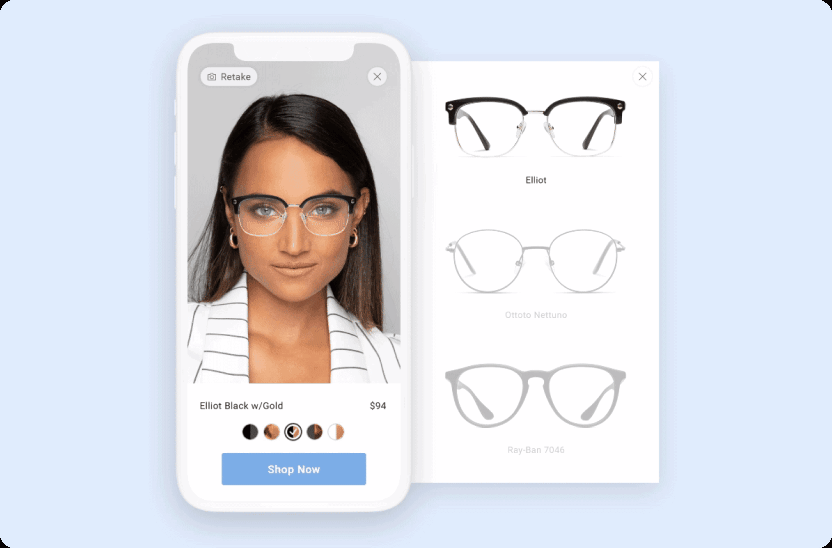The PD Request: Turning Awkward Encounters into Lifetime Patient Value
By Kate Gettinger, OD November 11, 2021
Over time, I’ve come to notice a certain situation repeating itself within my office. In fact, it has occurred frequently enough that I have come to be able to predict it very consistently when I first notice the subtle signs.
Usually, it occurs towards the end of the examination, when I turn to the patient and ask if they have any further questions for me before I turn them loose. There is usually a slight hesitation, a clear sign they want to say something but aren’t sure how to articulate it.
And we, as optometrists, know why they need it. When a patient asks for a PD measurement, it’s like a big billboard appears above the patient’s head reading: “I am going to buy my glasses online!”
Eventually, they say, “can you give me…a PD measurement?” From their tone, it's clear they aren’t sure what a PD measurement is, but they know they need it.
And we, as optometrists, know why they need it. When a patient asks for a PD measurement, it’s like a big billboard appears above the patient’s head reading: “I am going to buy my glasses online!” While some optometrists and opticians bristle at this request, instantly shifting into a defense mode and providing the measurement with an obvious reluctance or even trying to deter patients by charging a fee for the measurement, I would argue that it is in our interest to instead welcome this request as an opportunity to educate our patients. Asking for a pupillary distance measurement doesn’t necessarily mean you’ve lost a sale, and with the right attitude, you don’t have to consider these requests to be money flying out the door.

So, what can we do to salvage the situation when a patient is asking for a PD? First of all: give them the measurement. For free. There’s nothing to be gained by getting into a defensive huff, and if you charge for the measurement, it will sour your relationship with the patient, especially when they find out other doctors give it away at no charge. In addition, most online retailers have ways for patients to take a photo with some object of reference, like a credit card, that the retailer can use to determine the pupillary distance based on scale. At the end of the day, it’s much easier to just comply with the request.
If a patient is going to order online, it is in our interest to make sure they are getting an accurate prescription, including the optical center of the lens. It never fails: if a patient orders from a cheap retailer and gets an inferior product they can’t see out of because the spectacles weren’t made correctly, I always find them back in my office blaming me because “the prescription is wrong.” I have learned to reduce this occurrence by engaging patients in an educational conversation about online spectacles whenever I suspect they are looking to buy online.
 The first thing I bring up with patients is my honest opinion about whether I think they will be satisfied with an online product. If they have a simple, single vision prescription with low cylinder, I will give them a go-ahead and say they will likely get a satisfactory pair of glasses, but remind them that they will also get what they pay for. At the end of the day, my goal is for my patients to be able to see. If the only way they can afford a pair of glasses is to buy a cheap pair online, I would rather they have something rather than be forced to go without. In addition, some patients may opt to buy a nicer frame in your office but then want a cheap pair of sunglasses or back-up glasses online. If you are friendly and open with the patient, you won’t lose this in-office sale due to a confrontational attitude.
The first thing I bring up with patients is my honest opinion about whether I think they will be satisfied with an online product. If they have a simple, single vision prescription with low cylinder, I will give them a go-ahead and say they will likely get a satisfactory pair of glasses, but remind them that they will also get what they pay for. At the end of the day, my goal is for my patients to be able to see. If the only way they can afford a pair of glasses is to buy a cheap pair online, I would rather they have something rather than be forced to go without. In addition, some patients may opt to buy a nicer frame in your office but then want a cheap pair of sunglasses or back-up glasses online. If you are friendly and open with the patient, you won’t lose this in-office sale due to a confrontational attitude.
With these patients, I also always inform them that online retailers can vary drastically in regards to quality and accuracy. If they get the new pair and feel like they aren’t working, I request they bring them into my office and let me check them. If the script has been made wrong, they may be able to send them back for a remake. Or, it might open the opportunity to discuss remaking the lenses in-house to assure accuracy and quality.
If the patient has a prescription that I think will be easily botched by an online retailer, such as a script with high astigmatism or a progressive prescription, I will be honest with the patient. I explain how their prescription would benefit from the ability to be able to measure the position of the lenses while wearing the frame in order to permit a customized measurement.
 Usually, the dialogue involves explaining that a pupillary distance is simply the measurement between the eyes: it provides the width of where the prescription should be centered within the lens. However, it does not take into account the vertical placement of the prescription in the lens, and the difference of a millimeter or two can make a huge impact. At this point, I suggest that if there is a certain frame the patient likes which can only be acquired online, they should consider buying only the frames but letting our office do the lenses, so that we can assure the best quality and most accurate prescription by measuring them in the office.
Usually, the dialogue involves explaining that a pupillary distance is simply the measurement between the eyes: it provides the width of where the prescription should be centered within the lens. However, it does not take into account the vertical placement of the prescription in the lens, and the difference of a millimeter or two can make a huge impact. At this point, I suggest that if there is a certain frame the patient likes which can only be acquired online, they should consider buying only the frames but letting our office do the lenses, so that we can assure the best quality and most accurate prescription by measuring them in the office.
In addition, I often will discuss the fact that if our office makes the lenses, we have more ability to troubleshoot if something should be wrong. If the patient orders online, my hands are tied in regards to how much I can do to help them if the glasses turn out wrong.
Finally, I also gently remind patients that any insurance benefits they have will not be redeemable through online retailers. This goes for glasses as well as contact lenses. If their main concern is the convenience of being able to order online and have product shipped directly to their house, I remind them that we offer similar services and are happy to ship directly to patients if desired. Sometimes patients don’t realize that a brick and mortar can offer many of the same conveniences of online retailers, and permit a one-stop shopping experience.
In sum, you don’t need to panic if a patient wants a PD. Instead, use it as an opportunity to open a dialogue with the patient to educate them of the pros and cons of ordering online, and emphasize how you might be able to provide a lot of the same conveniences, and possibly more, in your office.